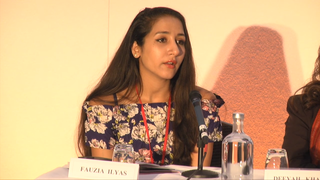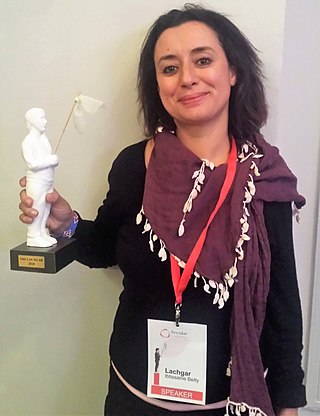Cultural Muslims, also known as nominal Muslims, non-practicing Muslims or non-observing Muslims, are people who identify as Muslims but are not religious and do not practice the faith. They may be a non-observing, secular or irreligious individuals who still identify with Islam due to family backgrounds, personal experiences, ethnic and national heritage, or the social and cultural environment in which they grew up. However, this concept is not always met with acceptance in conservative Islamic communities.

Islam is the dominant religion in Libya.

Hafid Bouazza was a Moroccan-Dutch writer.
The main religion in Morocco is Sunni Islam, which is also the state religion of the country. Officially, 99% of the population are Muslim, and virtually all of those are Sunni. The second-largest religion in the country is Christianity, but most Christians in Morocco are foreigners. There is a community of the Baháʼí Faith. Only a fraction of the former number of Maghrebi Jews have remained in the country, many having moved to Israel.
Ghazi Beji and Jabeur Mejri are Tunisian citizens sentenced on 28 March 2012 to 7.5 years' imprisonment for "transgressing morality, defamation and disrupting public order" after posting naked caricatures of Muhammad to Facebook. Mejri faced trial in court, while his friend Beji was convicted in absentia, having fled to Europe to escape prosecution. Mejri's appeal of his sentence was denied on 25 June 2012. Mejri's lawyer objected to his client being denied medical evaluation, describing him as "mentally unstable" and unemployed for the past six years.

Irreligion in Egypt is controversial due to the prominence of conservative social traditions and the persecution by the religious institutions in the country. It is difficult to quantify the number of atheists or agnostics in Egypt, as the stigma attached to being one makes it hard for irreligious Egyptians to publicly profess their views and beliefs.

Kacem El Ghazzali, is a Moroccan-Swiss secularist essayist and activist and is one of the few publicly agnostic Moroccans. Kacem speaks English, as well as German, French, Arabic and Berber. Mostly known for his publicly voiced atheism, his writings stress the importance of freedom of thought which, in his view, is lacking in countries dominated by Islam. His articles have been published in/by the Richard Dawkins Foundation, Huffington Post, Le Monde, Neue Zürcher Zeitung, Frankfurter Allgemeine Zeitung, Basler Zeitung, Tages Anzeiger, Berlingske and others.
Irreligion in Iran has a long historical background, but is difficult to measure, as those who profess atheism are at risk of arbitrary detention, torture, and the death penalty. Non-religious citizens are officially unrecognized by the Iranian government. In the official 2011 census, 265,899 persons did not state any religion. Between 2017 and 2022, the World Values Survey found that 1.3% of Iranians identified as atheists, and a further 14.3% as not religious. In the 1999-2004 cycle, the WVS had found 1% identified as atheist and 3% as not religious.

Irreligion in Africa, encompassing also atheism in Africa as well as agnosticism, secular humanism and general secularism, has been estimated at over tens of millions in various polls. While the predominant religions in Africa are Islam and Christianity, many groups and individuals still practice their traditional beliefs. Despite this the irreligious population is notable, especially in South Africa where 15.1% of the population describe themselves as irreligious and in Botswana, where 20% of the population describes themselves as non-religious.
Irreligion in the Middle East is the lack of religion in the Middle East. Though atheists in the Middle East are rarely public about their lack of belief, as they are persecuted in many countries where they are classified as terrorists, there are some atheist organizations in the Middle East. Islam dominates public and private life in most Middle East countries. Nonetheless, there reside small numbers of irreligious individuals within those countries who often face serious formal and, in some cases, informal legal and social consequences.

Zineb El Rhazoui is a Moroccan-born French journalist. She was a columnist for the Paris-based satirical magazine Charlie Hebdo from 2011 to 2017, but was in Morocco during the Charlie Hebdo shooting on 7 January 2015.
Sherif Gaber Abdelazim Bakr, is an Egyptian political activist and blogger who was arrested on October 27, 2013, for professing atheism, contempt of religion relating to activities on campus and atheist statements online.

Fauzia Ilyas is a Dutch Pakistani speaker, political activist, and the president and co-founder of Atheist & Agnostic Alliance Pakistan. Ilyas, an open atheist and apostate of Islam, fled from Pakistan after receiving threats to her life and faced potential legal charges for blasphemy in Pakistan. Ilyas received asylum in the Netherlands, where she is now a critic of Islam and campaigner for feminism, secularism, and atheist rights in Pakistan.

Ibtissam "Betty" Lachgar, also spelled Ibtissame is a Moroccan developmental psychologist, feminist, human rights activist, and LGBT advocate. She's the co-founder of the MALI Movement. She is one of the few openly atheist Moroccans.
Ex-Muslims are people who were raised as Muslims or converted to Islam and later left the religion of Islam. Challenges come from the conditions and history of Islam, Islamic culture and jurisprudence, and sometimes local Muslim culture. This has led to increasingly organized literary and social activism by ex-Muslims, and the development of mutual support networks and organizations to meet the challenges of abandoning the beliefs and practices of Islam and to raise awareness of human rights abuses suffered by ex-Muslims.

Massin Kevin Labidi, birth name was Mohamed Karim Labidi is a Dutch-Tunisian ex-Muslim and ex-Islamist of Amazigh descent. An atheist, political activist and blogger known for his criticism of Islam.

The situation for apostates from Islam varies markedly between Muslim-minority and Muslim-majority regions. In Muslim-minority countries, "any violence against those who abandon Islam is already illegal". But in some Muslim-majority countries, religious violence is "institutionalised", and "hundreds and thousands of closet apostates" live in fear of violence and are compelled to live lives of "extreme duplicity and mental stress."










